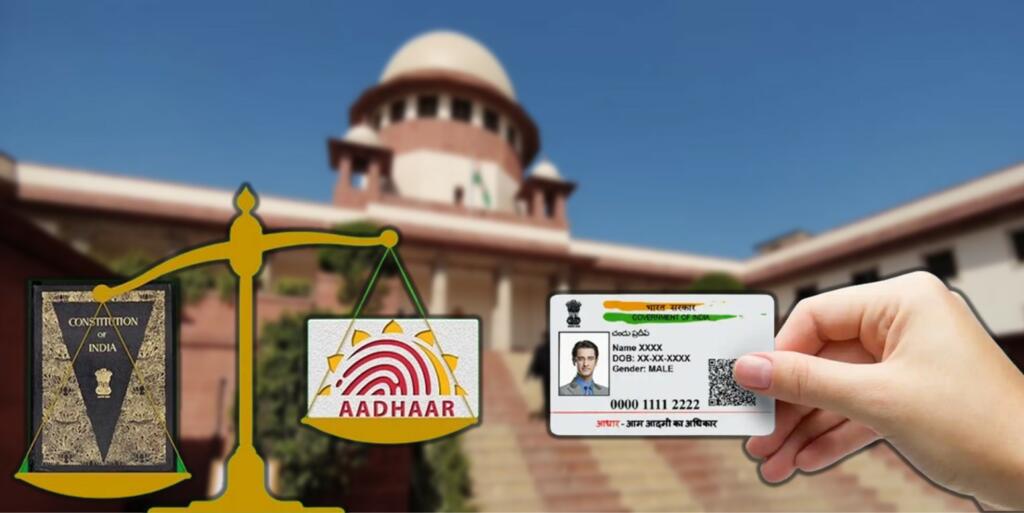Money Bill: ‘Aadhaar’ which means ‘foundation’ or ‘base’, has become the most talked about expression in recent years, not only in India but in many other countries and international platforms. The Aadhaar scheme can be said to have transformed the ‘public utility service’ domain of the nation.
The scheme is accredited to have brought about incredible levels of transparency by facilitating effective implementation of welfare schemes of the government. Contrarily, the ‘milestone public utility mechanism’ had to undergo a long-standing legal battle in the Supreme Court after making significant imprints in the lives of the citizens.
Controversy over passing Aadhaar as Money Bill
After the Union government promulgated the ‘Aadhaar Act’ as a Money Bill in 2016, the fairly obscure constitutional clause of Article 110 unexpectedly became the focus of attention. The critics got frustrated over the masterstroke of Modi government, which bypassed the difficult vote in the Rajya Sabha over the subject matter.
As a consequence, a series of petitions had been filed before the Apex Court, challenging the ‘legislative procedure’ followed for bringing in the “Aadhar Act”. The issue was, however, discussed in the case of K. S. Puttaswamy vs. Union of India, 5-Judge Bench.
In the instant case, the Court had to answer two critical questions. Firstly, whether the decision of the Speaker of the House of People under Article 110(3) of the Constitution, to certify a bill as a ‘Money Bill’ under Article 110(1) is final and binding or can be subject to judicial review. And secondly, whether the Act, 2016 had been correctly certified as a ‘Money Bill’ under Article 110(1) of the Constitution.
Majority Dictum of 5-Judge Bench in K. S. Puttaswamy vs. Union of India
The majority opinion was furnished by Dr Justice A.K. Sikri. He held that the right to ‘Judicial review’ is available with the Supreme Court with respect to whether a Bill is a ‘Money Bill’ or not, in certain circumstances.
Further, it was held that Section 7 of the Aadhaar Act had elements of a ‘Money Bill’, and the other provisions were incidental to the ‘core’ of the Aadhaar Act. Therefore, the said Act had been correctly certified as a ‘Money Bill’ under Article 110(1).
However, Justice Ashok Bhushan, in his dissent, opined a clear distinction between an ‘irregularity of procedure’ and a ‘substantive illegality’. The Hon’ble Justice held that, when a Bill does not fulfil the essential constitutional condition under Article 110(1), the said requirement cannot be said to be evaporated only on certification by the Speaker.
That is to say, accepting the submission that speaker’s certification immunes the challenge on the ground of not fulfilling the constitutional condition would permit the legislature from bypassing the constitutional mandate.
Also read: All the times, Aadhaar was discussed in Supreme Court
Fallacy over Speaker’s certification regarding Money Bill
The dissenting opinion of Justice Bhushan highlights the fallacy of the law with respect to the special privilege granted to the speaker for attributing a Bill as a Money Bill. Evidently, the same view had been endorsed by Justice D. Y. Chandrachud while adjudicating the review petition on the same issue.
The Hon’ble Justice laid down that the obligation placed on the Speaker of the Lok Sabha to certify whether a Bill is a Money Bill is not a mere matter of “procedure” contemplated under Article 122. It is rather a constitutional requirement, which has to be fulfilled according to the norms set out in Article 110.
Justice Chandrachud further points out that Article 122 will not save the action of the Speaker, if it is contrary to constitutional norms provided under Article 110. Thus, bestowing the Hon’ble court with the power of judicial review to adjudicate upon the validity of the action of the Speaker, the Hon’ble Justice held that Article 122 does not envisage exemption from judicial review, if there has been a constitutional infirmity. He opined that the Constitution does not endorse a complete prohibition of judicial review under Article 122 as it is only limited to an “irregularity of procedure.”
However, Justice Chandrachud dissented with the majority in the Review petition. He held that the decision of the Speaker of the House of People to certify the Aadhaar Act as a ‘Money Bill’ under Article 110(1) was unconstitutional.
Review Petition to adjudicate on the legality of ‘Aadhar Money Bill’
The Supreme Court, by a majority of 4:1, has dismissed a batch of review petitions challenging the decision of a 2018 five-judge Constitution bench upholding the Aadhaar Act, 2016 as a Money Bill.
Evidently, four out of the five judges, namely Justices AM Khanwilkar, Ashok Bhushan, Abdul Nazeer, and BR Gavai, held that there was no basis for reviewing the 2018 verdict. On the contrary, Justice Chandrachud held that the Aadhaar Act cannot be treated as a Money Bill and passing it as one would be a fraud on the Constitution.
Justice Chandrachud was, thus, of the opinion that review petitions should be kept pending until the larger bench decided the questions referred to it in the Rojer Mathew case, with respect to ‘the correctness of Puttaswamy (Aadhaar-5J.) judgment’.
However, the majority did not agree with the present CJI, at the time when the verdict was pronounced, and thereby, upheld the legality of the ‘Aadhar Act, 2016’.
Support TFI:
Support us to strengthen the ‘Right’ ideology of cultural nationalism by purchasing the best quality garments from TFI-STORE.COM
Also Watch:
https://www.youtube.com/watch?v=avxiM2F4pS4
